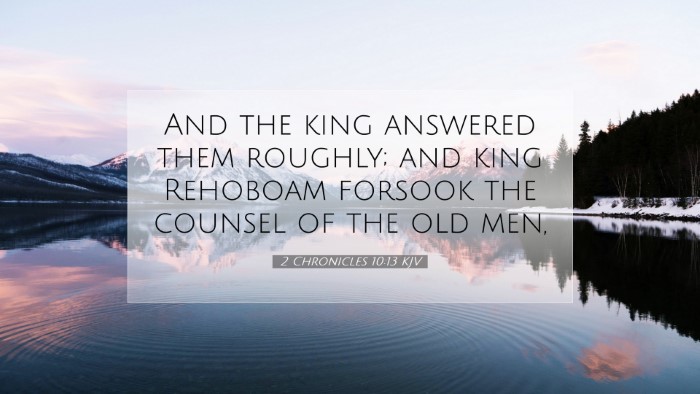Commentary on 2 Chronicles 10:13
Verse: 2 Chronicles 10:13
"And the king answered them roughly; and king Rehoboam rejected the counsel of the old men."
Overview
This pivotal moment in the history of Israel marks the transition of power from Solomon to his son, Rehoboam. The choices made by Rehoboam in response to the request of the people reflect significant themes in leadership, wisdom, and the consequences of counsel.
Historical Context
The events in this chapter occur soon after the death of King Solomon, which sets the stage for a crucial decision by Rehoboam. The kingdom is in a fragile state, burdened by the heavy taxation and forced labor imposed during Solomon's reign. The people approach Rehoboam to request lighter burdens, leading to a contrast between the counsel of seasoned elders and that of inexperienced youth.
Analysis of Key Themes
- Leadership and Its Challenges
Rehoboam's response showcases the difficulties leaders often face in balancing authority with the needs of their constituents. His rejection of wise counsel for the sake of asserting his power is an illustration of youthful arrogance and a lack of discernment.
- Wisdom vs. Foolishness
The stark difference between the advice of the older men, who suggest a more compassionate approach, and the younger advisors, who advocate for a demonstration of strength, highlights the importance of wisdom. According to Matthew Henry, the older men understood that a good leader wins the people's hearts by serving them rather than exercising tyranny.
- The Consequences of Rehoboam's Decision
Rehoboam's choice leads to a division within Israel, resulting in the northern tribes breaking away and forming their own kingdom. Albert Barnes emphasizes that this decision not only illustrated Rehoboam's poor judgment but also fulfilled God’s prophecy regarding the division of the kingdom due to Solomon’s idolatry. This moment serves as a cautionary tale for leaders about the implications of their choices.
Commentary from Notable Scholars
Matthew Henry
Henry notes that Rehoboam’s response was emblematic of foolish arrogance. He suggests that those in authority should be cautious in how they respond to their subjects, as harshness can incite rebellion. This response illustrates the oft-repeated principle that power must be tempered with wisdom and understanding.
Albert Barnes
Barnes points out the practical wisdom in the advice of the older men. Their counsel reflects a deep understanding of governance's relational dynamics. He argues that Rehoboam's failure to heed this wisdom led to a moral and political failure that reverberated through the subsequent generations, profoundly affecting the trajectory of Israel's history.
Adam Clarke
Clarke delves into the psychological underpinnings of Rehoboam's choices, noting that young leaders often succumb to peer pressure from those close to them instead of seeking the counsel of those with more experience. He underscores that a leader's arrogance can blind them to the wisdom available from the past, leading to ruin.
Application for Today
For pastors, students, and theologians, this scripture offers a rich ground for reflection on their leadership styles. It serves as a reminder of the imperative to cultivate wisdom by seeking counsel from those with experience, particularly in moments of transition and upheaval.
Moreover, the verse reminds leaders of the gravity of their decisions and the potential impact on communities. It urges a reflective approach to leadership, one that values humility and the insights of others.
Practical Takeaways
- Seek Godly Counsel: Always prioritize the input of wise leaders and incorporate diverse viewpoints in decision-making.
- Balance Authority with Compassion: Understand that leadership is not just about ruling but also about serving the community.
- Be Aware of Consequences: Each decision has ramifications, and leaders should assess the potential long-term outcomes of their choices.
Conclusion
The circumstances surrounding 2 Chronicles 10:13 remind us of the crucial importance of wisdom in leadership. The legacy of Rehoboam serves as both an admonition and a guide for contemporary leaders in the church and society. By reflecting on his choices and their consequences, we can cultivate a more prudent approach to leadership driven by humility, understanding, and godly counsel.


